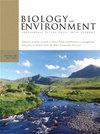WHAT IS THE FUTURE FOR MARINE PROTECTED AREAS IN IRISH WATERS?
IF 0.6
4区 环境科学与生态学
Q4 ENVIRONMENTAL SCIENCES
Biology and Environment-Proceedings of the Royal Irish Academy
Pub Date : 2022-01-01
DOI:10.3318/BIOE.2008.108.1.9
引用次数: 11
Abstract
Abstract:The UK and Ireland, in common with most other European states, are in the middle of a period of rapid expansion in the number of marine protected areas (MPAs). Most of these areas are being designated as Special Areas of Conservation (SACs) under the EU Habitats Directive. This level of activity will dominate the future of MPAs in Irish waters, presenting opportunities for marine conservation and potentially bringing wider benefits to society. The success of SACs is likely to depend heavily on the attitudes and engagement of people that use protected sites (stakeholders). This article reports on a stakeholder workshop where the potential benefits of, achievement of the potential of, and improvements in MPAs were discussed. A lack of baseline data and inefficient communication of existing information appear to restrict the perceived success of some existing reserves. Improvements seem possible in legislative coherence, public engagement and the science base. Resources for monitoring and managing protected areas are always likely to be stretched. Ways have to be found to make use of whatever data are available, potentially leading to public access websites for each SAC, where stakeholders can upload information. There appeared to be a broad consensus on many points in the day's discussions. In keeping with the workshop format, individual participants were invited to emphasise areas of omission, disagreement or consensus in comments that follow the main body of this article.爱尔兰水域海洋保护区的未来是什么?
摘要:与大多数其他欧洲国家一样,英国和爱尔兰正处于海洋保护区(MPAs)数量快速扩张的时期。根据欧盟生境指令,这些地区中的大多数被指定为特别保护区。这种活动水平将主导爱尔兰水域海洋保护区的未来,为海洋保护提供机会,并可能为社会带来更广泛的利益。sac的成功很可能在很大程度上取决于使用受保护地点的人(利益相关者)的态度和参与。本文报告了一个利益相关者研讨会,其中讨论了海洋保护区的潜在利益、潜力的实现和改进。缺乏基线数据和现有资料交流效率低下似乎限制了一些现有储备的成功。在立法一致性、公众参与和科学基础方面,改进似乎是可能的。用于监测和管理保护区的资源可能总是捉襟见肘。必须找到利用任何可用数据的方法,可能导致每个SAC的公共访问网站,利益相关者可以在那里上传信息。在当天的讨论中,各方似乎在许多问题上达成了广泛共识。为与研讨会形式保持一致,请个别与会者在本文正文之后的评论中强调遗漏、不一致或一致的领域。
本文章由计算机程序翻译,如有差异,请以英文原文为准。
求助全文
约1分钟内获得全文
求助全文
来源期刊
CiteScore
1.10
自引率
0.00%
发文量
6
审稿时长
>36 weeks
期刊介绍:
The journal aims to offer a broad coverage of the subject area, including the following:
- biology and ecology of the Irish flora and fauna
- microbial ecology
- animal, plant and environmental physiology
- global change
- palaeoecology and palaeoclimatology
- population biology; conservation of genetic resources
- pollution and environmental quality; ecotoxicology
- environmental management
- hydrology
- land use, agriculture, soils and environment.
Submissions on other relevant topics are also welcome, and papers of a cross-disciplinary nature are particularly encouraged.

 求助内容:
求助内容: 应助结果提醒方式:
应助结果提醒方式:


